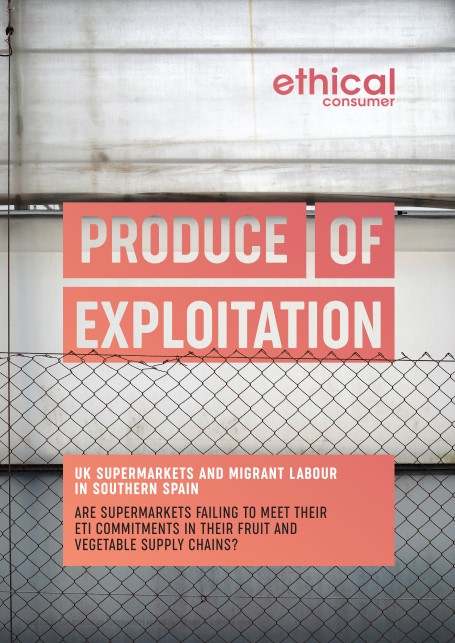UK supermarkets are connected to endemic workers’ rights abuses in the Spanish regions of Almeria and Huelva, through their fruit and vegetable supply chains.
31st March 2023

31st March 2023
For 20 years, migrant agricultural workers in the Almeria and Huelva regions of southern Spain have faced flagrant abuses of their basic rights. They have been refused legal wages, fired for joining unions, forced to work in unsafe conditions, shouted at for taking toilet breaks and sexually assaulted and harassed.
As a 2022 report funded by the Spanish government says, “The miracle of Spanish food exports would not exist without labour exploitation.” This is especially pronounced in the regions of Huelva and Almeria.
Produce on our supermarket shelves comes from these regions. During the winter months of December to February, one in every six tomatoes eaten in the UK is likely to be from Almeria. At least six out of every 10 strawberries between January and March are likely to be from Huelva.
This new report provides detailed evidence of the scale of the abuses which are endemic across the agricultural sectors in Huelva and Almeria.
It collects evidence from trade unions, academic and NGO reports, media investigations, and UN reports. It also collates a number of corroborating interviews with workers, conducted by Ethical Consumer during recent years.
Ethical Consumer’s analysis found that eight out of the nine fundamental workers’ rights standards championed by UK supermarkets are being violated on farms in Almeria and Huelva. Evidence was found of all the following abuses:
Considering their substantial buying power, supermarkets have enormous untapped potential to improve conditions for workers. As a major market for Huelva and Almeria’s products, they could, should they choose to, push for real and meaningful change. Yet so far they have failed to take meaningful action, with supply chain policies and enforcement policies only applied to direct suppliers, and voluntary certification schemes and memberships failing to ensure compliance with basic workers’ rights at the farm level.
Supermarkets have a legal and moral obligation to ensure that the rights of workers they rely on are being met. International standards like the UN Guiding Principles on Business and Human Rights set standards for companies around the world. A growing body of legislation is translating these into law. For example, the upcoming EU Forced Labour Ban will “prohibit products made with forced labour”, including for export, meaning that some UK supermarket products could come under its remit.
UN Special Rapporteur on extreme poverty and human rights, Olivier De Schutter, said,
“For years, authorities and employers in southern Spain have been content to sit back and watched as migrant workers endure the most horrific, inhumane working conditions.
“In 2020, I reached out to the Spanish Government and companies involved calling for an end to this abuse. But as Ethical Consumer’s powerful report makes painfully clear, the violations continue – in complete disregard of international human rights standards.
“Abuse of migrant workers is rife throughout food systems – the incessant search for bigger profits pushing down standards to ever lower levels. I urge supermarkets to end their complicity in this abuse and address the issue head on, using this report as their guide.”

Our report contains a number of detailed findings. Here are just a few in numbers:
The report lists recommendations, both short-term and long term.
In the short-term, there are a number of immediate steps supermarkets should take:
However, as the report highlights in detail such steps will not be sufficient alone to address the endemic issues in the region.
The key recommendation of this report is that UK supermarkets commit to supporting Worker-driven Social Responsibility (WSR) mechanisms as they begin to develop in the regions.
These are worker-led models for change, under which workers define the conditions they want to see on farms and retailers make legally-binding commitments to only purchase from suppliers that ensure those conditions are met. They are considered the “emerging gold standard” for worker rights, and have transformed the lives of workers.
This approach transforms traditional approaches to corporate responsibility by: i) centering the experiences and knowledge of those on the ground; ii) ensuring enforcement is truly independent of both retailers and producers; iii) and defining legally-binding processes to ensure that retailers take an active role in remedying violations in their supply chains.
As a result, WSR models have already seen enormous success around the world.
“Worker Driven Social Responsibility is a model that is proven to work. But the teeth behind the WSR model must be the binding commitment of retail food chains to condition their purchases on compliance with fundamental human rights standards.
“It’s simple: retail food giants commit to purchase from farms that respect workers’ rights and to cut-off purchases from those who violate their rights, with a dedicated monitoring body that listens to workers’ voices, protected against retaliation, monitoring and enforcing compliance.
“It’s time for the major retail food chains in the UK to be done with failed, voluntary social audits and to step up to the gold standard for human rights in the agricultural industry today. It’s time for UK supermarket giants to support worker-driven initiatives for change.”
The Produce of Exploitation report is available to download in English or Spanish.
Ethical Consumer would like to thank the following organisations for their support and contribution to the report and the campaign calling on UK supermarkets to address problems in their southern Spanish supply chains more broadly.
Many individuals in Spain including current and former agricultural workers provided us with the information needed to produce this report, as did the worker organisations Jornaleras de Huelva en Lucha and SOC-SAT.
Anti-Slavery International peer-reviewed this report and provided valuable advice on how to position the abuses within the broader context of worker exploitation and emerging legislation on forced labour.
Leigh Day solicitors provided a pro bono proofreading of the report and provided valuable comments.
The Coalition of Immokalee Workers educated us on WSR models and their potential for creating meaningful change.
We would like to thank The Landworkers’ Alliance and La Via Campesina Europe for providing information, including through the many articles they have published documenting the abuses.
Rayne Laborde Ruiz, George Ruiz, Stuart Hall and The Collective of African Workers provided us with images that help readers gain a sense of the nature of the harsh working conditions in the regions, and the sheet scale of intensive production in the plastic greenhouses.
Sign up to the Spain campaign newsletter and find out more about the campaign on our Spain campaign page.